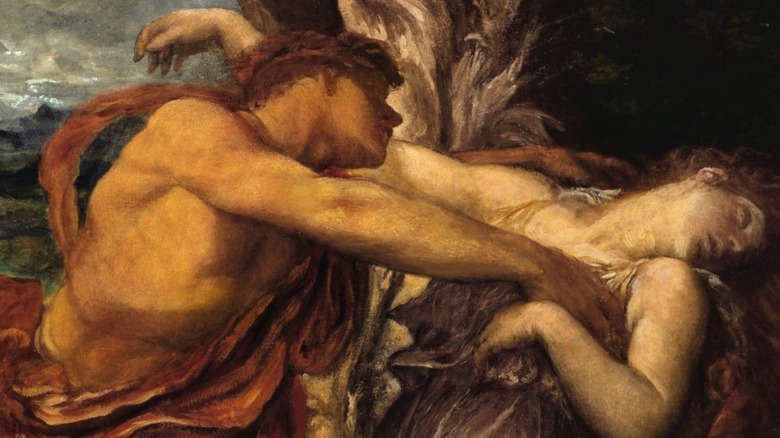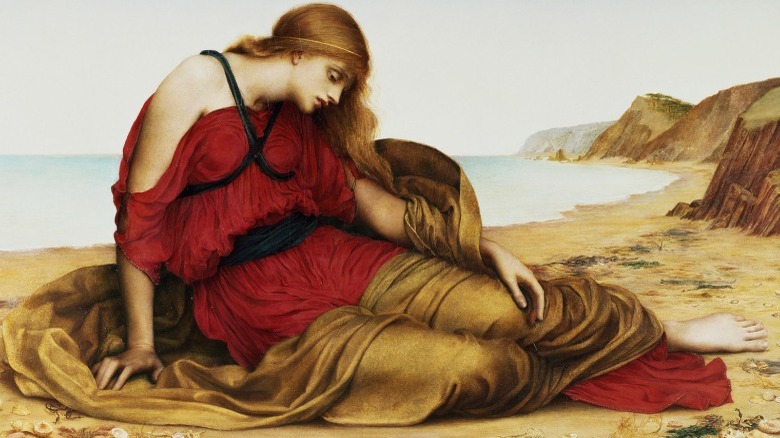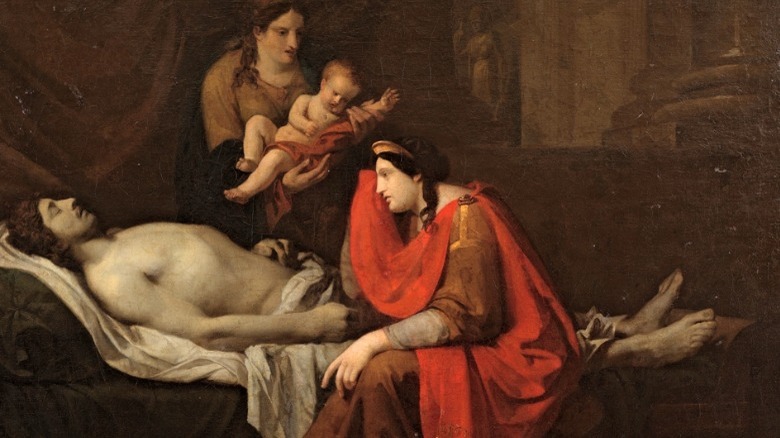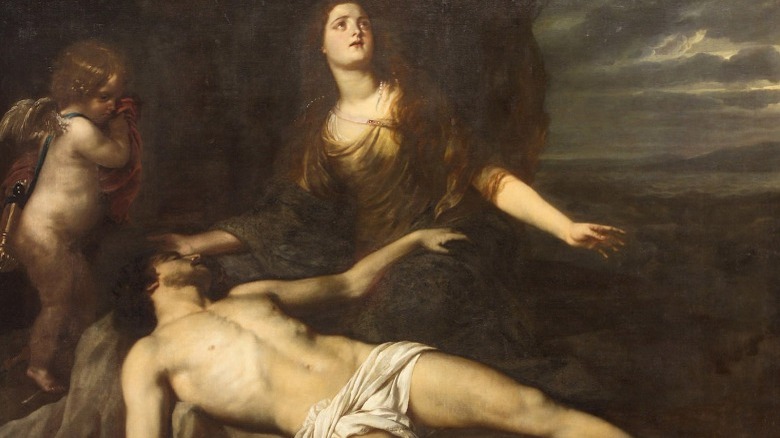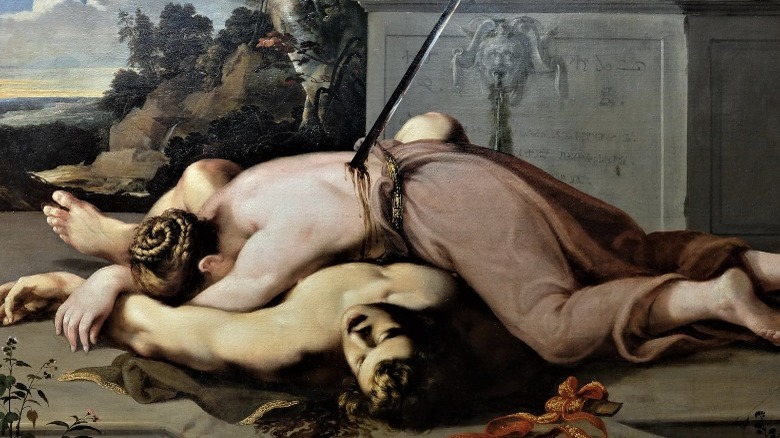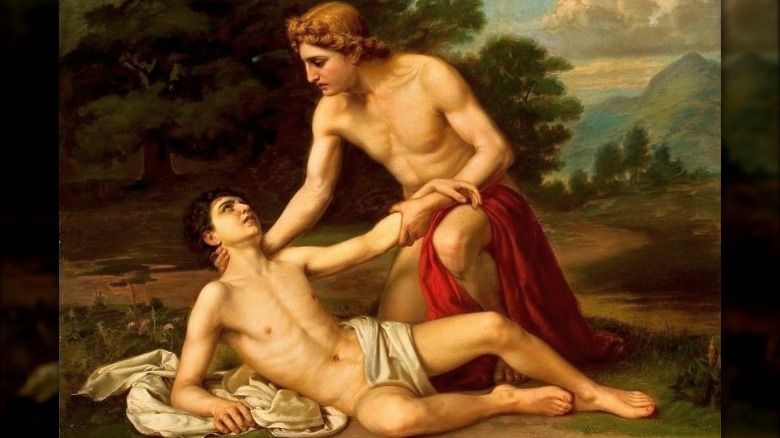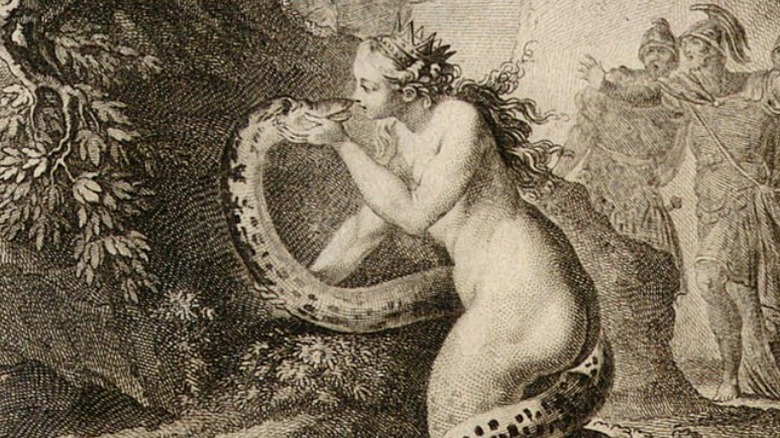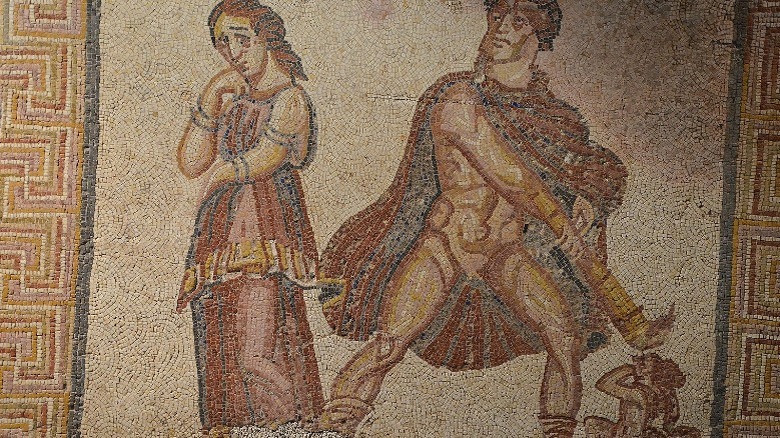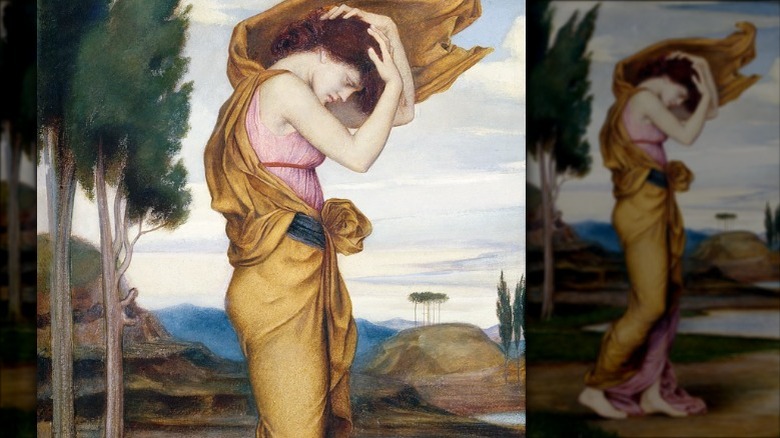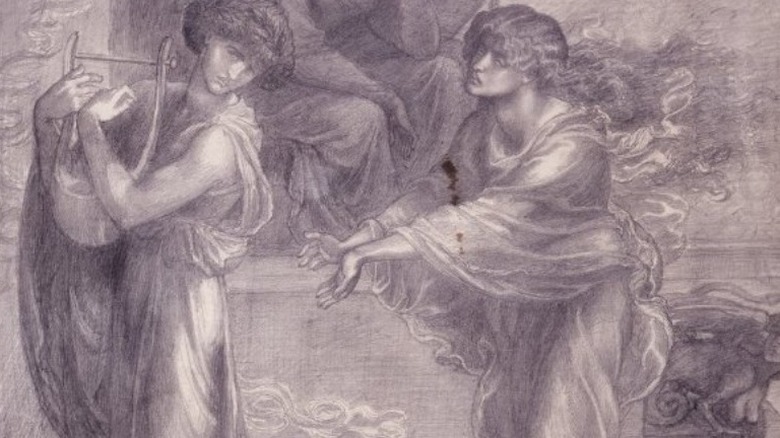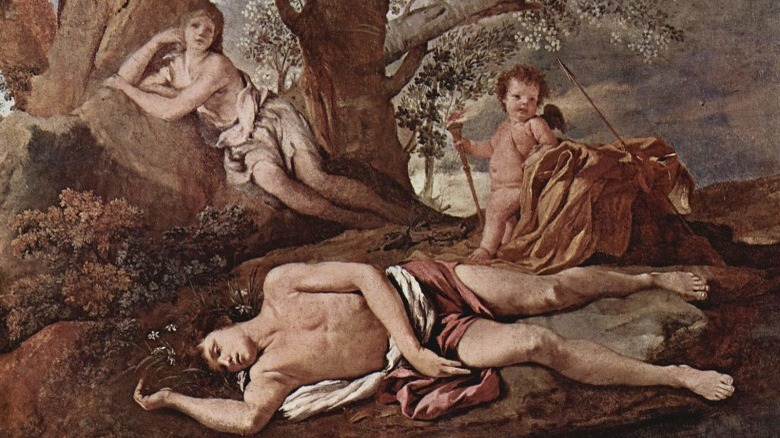The Most Tragic Love Stories In Greek Mythology
For as long as humans have been around, they've been going about the business of making more humans. (Obviously.) And tied up in that is the messy business of relationships, and while it might be tempting to think of the ancients as above all that — they were too busy just surviving without things like refrigeration and electricity — the truth is much juicier.
Back in 2014, The Guardian reported that some ancient graffiti had been discovered carved into the rocks of Astypalaia. Dating back to the 5th or 6th century B.C., the etchings were described as "monumental in scale," and Dr. Andreas Vlachopoulos explained them in the most hilariously serious way, saying: "They were what I would call triumphant inscriptions. They claimed their own space in large letters that not only expressed sexual desire, but talked about the act itself."
While it's impossible to tell what Nikasitimos and Timiona would have thought about their messages being read and reinterpreted 2,500 years after they hooked up — often, based on the amount of graffiti — it's pretty safe to say that considering the accompanying artwork, they seem like the type that would think it's pretty awesome. Their relationship went on long enough for there to be a lot of graffiti, but obviously, not all relationships were that successful. And just like some of the most famous Greek myths told stories of what was going on in the natural world around them, they told their fair share of heartbreaking love stories, too.
Theseus and Ariadne
Theoi says there are a few different variations on Ariadne's story, but let's talk tragedy. Ariadne was the daughter of King Minos: He was the one who demanded tribute from Athens — in the form of young men and women who would be sent into the labyrinth to feed the Minotaur. By the time Theseus disembarked from the boat, he'd been doing it for a while.
When Ariadne saw Theseus and fell madly in love with him, the game changed. She went to Daedalus and convinced him to share the secrets of the Labyrinth with her, which she then gave to Theseus — along with a ball of unbreakable string, forged by Hephaestus. The string would allow him to find his way back out of the labyrinth, and he did — after killing the Minotaur.
While most ancient writers agree that Theseus had promised to marry her before they hopped on a ship bound for his home of Athens, what happened next varies between tellings. Most say their relationship came to an end when they stopped at the island of Naxos, where he waited for her to fall asleep, and then abandoned her there. Some cut him some slack and suggest he did it not because of cold feet, but because Dionysus intervened and told him to back off. It's those stories where things turn around for Ariadne, who ends up marrying the god and gaining immortality. In other versions, though, she's so distraught that she commits suicide at his betrayal.
Hector and Andromache
The story of Hector and Andromache starts in the "Iliad" and continues in a few other works. When audiences first meet the couple, they're happily married with a newborn baby. Hector is next in line to become the king of Troy, and life's pretty darn good... until the Trojan War kicks off, and Hector heads off to the front lines.
That, of course, is where he dies. He's killed by Achilles after the death of Achilles's "friend," Patroclus, and not only does he die, but Achilles refuses to give his body back for a proper burial. (In a double whammy, ThoughtCo. says Achilles had previously killed Andromache's father and seven brothers.) Once that insult is remedied — and Andromache is left to mourn her husband — the world just piles on the grieving widow.
When the Greeks come out triumphant, the women of Troy are turned into spoils of war. Andromache is given to Neoptolemus, who just happens to be the son of Achilles. Free to do whatever he wants with his new prize, his first act is to take her son — the one Hector bids farewell in a moving moment — and throw him off the walls of Troy. Andromache is forced to bear three children for Neoptoleumus — much to the chagrin of his wife, Hermione. When he gets killed, she returns to first her husband's brother — to take her place as queen — while still lamenting the loss of her beloved Hector.
Helios and Klytie
Like most of the Greek deities, Helios had a list of lovers a mile long. Perhaps unsurprisingly, being a Titan and god of the sun meant that he didn't really seem to be bothered with the details of them too much, and that was absolutely the case with both the sea-nymph Klytie and the princess Leucothoe.
It was Ovid who wrote (via Theoi) that Helios lingered in the sky just to look down at his Persian princess, and sometimes, he stayed there so long that a day would suddenly last much, much longer than it normally should. Finally disguising himself as her mother, he snuck into Leucothoe's bedchamber one night and — after revealing his true identity — did exactly what's expected of someone who sneaks into the bedroom of his beloved.
Their affair didn't go unnoticed, though, and the wildly jealous Klytie made sure everyone knew what was going on behind those closed doors. Embarrassed by the shame and spectacle, Leucothoe's father sentenced her to death, and buried her alive. Helios tried — and failed — to revive her, and instead, planted frankincense over her final resting place. Klytie, meanwhile, was sorely disappointed that the whole thing didn't work out in her favor. Instead of running into her arms, Helios ignored her: She sat beneath him for nine days, watching as he crossed the sky above her. She's still there, and now, she's the sunflower.
Hero and Leander
It's not clear just how old the story of ill-fated lovers Hero and Leander is, but according to the Bryn Mawr Classical Review, scattered references to the tale made by antiquity's biggest writers — like Virgil — suggests that it was so well-known, it wasn't even necessary to identify them by name when referencing their doomed love.
Christopher Marlow's poem based on the tale describes Hero as a woman courted by the gods, but who had only eyes for her beloved Leander. Forbidden to marry, the lovers vowed that nothing was going to keep them apart — not even the unpredictable waters of the Hellespont, or the tower that Hero lived in. Every night, she lit a flame at the top of the tower and he swam across from the far shore to meet her, then returned home every morning.
Until one fateful winter's night, when a storm swept through the pass. Hero's flame was extinguished, and it was only the following morning that she learned what had happened. Leaning out her tower window, she saw the broken body of her beloved on the rocks below. Unable to live without him, she jumped from the tower to join him (via Johns Hopkins).
Pyramus and Thisbe
Pyramus and Thisbe are another pair of ill-fated lovers driven to extremes by parents who forbid them to marry. Ovid wrote of their tale in "Metamorphoses," (via Theoi), saying that the pair grew up living next to each other. As they got older, their lifelong friendship blossomed into love, but their parents refused to give them permission to marry. Deciding that life on the run was better than a life apart, they made arrangements to run away together, and did.
They arranged to meet each other beside a nearby tomb, and Thisbe was the first to arrive. While she was waiting, a lioness approached. She dodged the lioness but dropped her veil in the process, which the lion soon investigated. When Pyramus arrived, he found no trace of his beloved ... and then, he saw her bloody veil and the pawprints of the lion. Assuming the worst, he stabbed and killed himself rather than live without her.
Thisbe returned to find her lover dead, her bloody veil in his hand. Realizing he had thought her dead, she leaned over and fell on his sword to join him in death. Their bodies are later found by their parents, who allow the pair to share a funeral pyre and finally, an urn.
Apollo and Hyakinthus
Just because one party in a relationship happens to be a god, that doesn't mean things are going to go smoothly — or according to plan. It was Apollo who fell in love with a Spartan prince named Hyakinthos, but the sun god wasn't the only one interested in the breathtakingly beautiful youth. Zephyros — the West Wind — had become enamored of the prince as well, and grew wildly jealous of the time he was spending with Apollo.
Jealousy doesn't always lead people to make rational decisions, and it turns out that the same is true of divine beings. (In ancient Greece, at least.) Hyakinthos's fate is mentioned by several ancient writers, including Hesiod, Bion, and Pausanias, says Theoi, and they tell a similar tale.
Apollo and Hyakinthos were throwing the discus one day when, in a fit of rage, the West Wind swept through and made Apollo's throw go bad. The discus struck and killed the prince, and even though Apollo tried every way he knew of to save him, he couldn't change what Fate had already settled. To preserve him, the god turned the prince into the larkspur flower, also known as the hyacinth.
Kadmus and Harmonia
Harmonia's story shows just how awful the gods can really be, as she was cursed for something that absolutely wasn't her fault. The daughter of Ares and Aphrodite, it was Aphrodite's husband, Hephaistos, who really took issue with her. On the day she married Kadmos, he presented her with a beautiful necklace... that just happened to have another gift attached to it: a curse that would travel through the generations, as punishment for being a product of Aphrodite's affair.
Kadmus describes just how relentless the curse was in Euripides' "Bacchae" (via Theoi): "I am to reach no respite from this curse; I may not even cross the downward stream of Akheron to find peace in death." Pieces of their curse are scattered throughout various ancient writings, and include things like relentless war and battle, dying family members, and witnessing the desecration of their homeland. They were harassed by Aphrodite — who tried relentlessly to come between them — and were driven from the city Kadmos founded, Thebes. Perhaps worst of all, they lived to see the curse travel down through their children and grandchildren as well.
This story, at least, has a bit of a happy ending: The gods finally intervened to say that enough was enough, and first changed the pair into massive serpents, then sent them to the Islands of the Blessed.
Hercules and Megara
Hercules is easily one of the most famous of the Greek heroes, but the story of his first wife, Megara, is nothing like what played out in the Disney movie. Megara was a princess of Thebes, and was gifted to Hercules as a big "thank-you" for saving the city. What happened next, says the World History Encyclopedia, has details that vary by the telling, but an overall story that stays pretty much the same.
The couple lived a pretty happy life, had a bunch of children, and generally loved each other ... until Hercules was called away. (Why he leaves is the bit that changes according to the source.) While he's gone, a man named Lycus kills Megara's father and tries to get her to marry him. She refuses, determined to hold out for the return of her husband.
Hercules does, in fact, make it home in time to kill Lycus. While he gave thanks to the gods, Hera decided it was the perfect time for a little revenge. (Hera, remember, is still very, very mad about Hercules's existence in the first place, as he's the result of an affair between Zeus and a mortal woman.) Hera delivered him a healthy helping of hallucinations, and — convinced that his own children belong to Lycus and that his beloved wife is Hera — he killed his entire family. Older versions of the story skip Lycus and go right to the killing, but the end result is the same.
Hercules and Deianira
Hercules's second wife was Deianira, a princess of Calydon and the sister of a man Hercules had met during his Labors. Promising her brother — who was, at the time, dead — that he'd make sure Deianira was taken care of, he married her after a handful of years questing and doing all the things that a demi-god was expected to do. It turned out that there was really no promise necessary, as she was a warrior in her own right, with little interest in settling down ... until she met Hercules.
They lived a quiet and happy life for a good long while, says World History Encyclopedia, until Hercules accidentally killed a member of the household. They decided to leave, and after a run-in with the centaur Nessus, things went sideways. Hercules killed Nessus for trying to assault Deianira, but as he was dying, the centaur told her that his blood was special. Just a little of it would ensure Hercules would be hers forever ... and it definitely wasn't deadly.
Nope, not at all.
Unfortunately for everyone involved, it actually was deadly, contaminated by the poison on Hercules's own arrows. Some time went by, and Hercules decided it would be a great idea to take a mistress. Deianira got out the blood vial, sprinkled some on his shirt, and he died a slow and agonizing death. It was so slow that he had time to build and climb his own funeral pyre, and realizing what she had done, Deianira hanged herself.
Orpheus and Eurydice
The story of Orpheus and Eurydice started off badly right from the start. Deeply in love and about to get married, it was on their wedding day that she died after being bit by a snake. Orpheus, however, was not about to stand for that sort of thing, so he picked up his lyre and headed to a place few dared to travel: the Underworld. Once there, he made it all the way into the very center of the afterlife, and pleaded with the king and queen for the life of his beloved back. They were so moved by his pleas that History Today says even their three-headed hellhound, Cerberus, lay at the musician's feet. It was a clear sign: Her death had not been fair.
So, Orpheus was given his beloved, with one condition. He was to lead her back up into the land of the living, and if he were ever to look back at her, she would return to her place in hell. They were only a few steps from both crossing over into safety when he looked back, and Ovid wrote (via Theoi): "Instantly she slipped away."
Orpheus begged the ferryman to take him to the afterlife so he could rejoin his beloved wife, but this time, he was completely and soundly refused. He sat at the edge of the River Styx for days, finally giving up and returning to the land of the living. He never remarried: "... his love-pledge was forever."
Echo and Narcissus
It was Ovid, too, who recorded the story of Echo and Narcissus (via The Collector), and it's heartbreaking stuff. Narcissus was an incredibly beautiful man whose appearance bordered on the surreal, and Echo was just one of the many who fell in love with him. A talkative nymph, she had already been cursed by Hera (after being caught helping Zeus carry on his adulterous affairs), and could only repeat what was said to her. Not being able to tell Narcissus how she felt, she tried to show him with a hug. He didn't react well, condemning her: "Take off your hands! ... Better death than such a one should ever caress me!"
Echo — horrified at the reaction of her beloved — withdrew to the forest and wasted away to nothing but a voice ... which can still be heard today.
That's not the end of the story, though, and her crushed soul got the attention of Nemesis. The goddess of revenge decided he needed to be knocked off his high horse a bit, so she lured him to a spring. It was there that he saw his reflection in the waters, and became so obsessed with his own image that his desire for himself turned into the same sort of pain she had felt, and he, too, withered away to nothingness. His last word was "Farewell," and Echo was the only one to answer.
